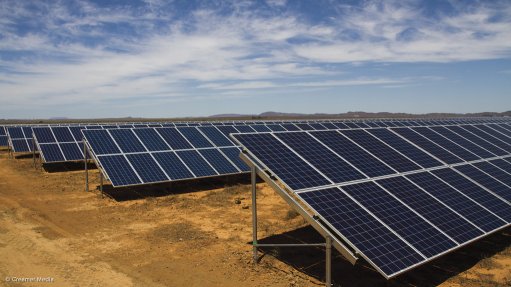
MOMENT IN THE SUN Governments will be showcasing high priority renewable energy projects to attract private sector participation and investment
Photo by: Duane Daws
The African Union’s (AU’s) planning body, the New Partnership for Africa’s Development (Nepad), is undertaking an exercise that will accelerate the development and implementation of Africa’s high-priority renewable-energy projects and will be organising a showcase at the Africa Energy Indaba for African countries that are ready to show an investment prospectus.
This is one of Nepad’s contributions to the implementation of the Africa Renewable Energy Initiative that was endorsed by the AU Summit in June last year and to the United Nations- (UN-) led Sustainable Energy for All (SE4All) initiative. The exercise involves the provision of a platform where project owners at national level directly present their chosen projects to developers and financers and strike business deals for either the development of projects to bankability or financial close of the project if it has reached bankability.
The first batch of projects will be from countries that have completed or are in the process of completing the Action Agenda and Investment Prospectus of the SE4All. Nepad is cooperating with the Africa Energy Indaba to host focused conference sessions where project owners will present their selected projects to potential investors, developers and other interested stakeholders to consider funding them for further development or implementation.
“This will be the first time that a country’s government will be showcasing its high-priority renewable-energy projects to the open market and looking to attract private-sector participation and investment. Our role is to facilitate and aid this matchmaking to ensure the projects are developed. We believe this is what the private sector has been looking for, opportunities to view new renewable- energy project opportunities by the project owners,” says Nepad senior energy adviser Professor Mosad Elmissiry.
He points out that the SE4All initiative is a multistakeholder partnership between governments, the private sector and civil society. Launched by the UN secretary-general in 2011, it has three interlinked objectives to be achieved by 2030: ensuring universal access to modern energy services, doubling the global rate of improvement in energy efficiency and doubling the share of renewable energy in the global energy mix.
At the core of the SE4All initiative is the concept that access to sustainable energy is not an end in itself, but rather that increased access to sustainable and modern energy services is key to achieving improvements in most sectors, including health, education, economic development, poverty reduc- tion, gender empowerment, environment protection and climate change.
Elmissiry explains that the SE4All initiative has been welcomed by many African countries on the understanding that it advances Africa priority energy projects and is implemented alongside other ongoing national, regional and continental energy initiatives in Africa like the Programme for Infrastructure Development in Africa. This is in particular relevant with regard to resource mobilisation and action-orientated delivery mechanisms.
Currently, there are 44 countries that have joined SE4All, the majority of which have completed a rapid assessment and gap analysis. In addition, Action Agendas and Investment Prospectuses are either developed or under development in about 17 African countries.
Energy Indaba
The Africa Energy Indaba will host the SE4All countries that will be showcasing their high-priority renewable-energy project opportunities, identified at country level as the “high-priority projects” to provide energy to the respective country.
The actual project owners – country government representatives – will be providing the full investor prospectus at the Africa Energy Indaba and showcasing the high-priority project opportunities to the private sector to consider for investment.
African countries will be present to showcase their investment prospectus and potential investors will have the opportunity to carefully examine each project, enter into one-to-one discussions with the project owners and conclude specific deals with the project owners.
Projects to be presented are at different stages of development, covering those that have finished both prefeasibility or full feasibility studies and those looking for finance for implementation. The session will be facilitated by Nepad.